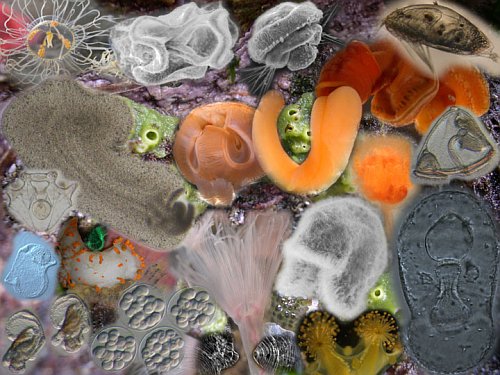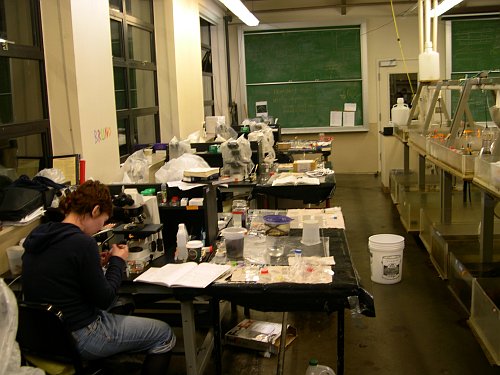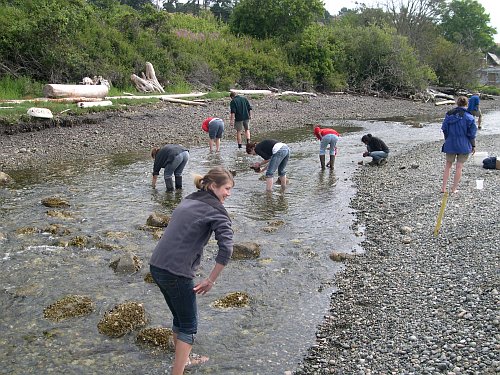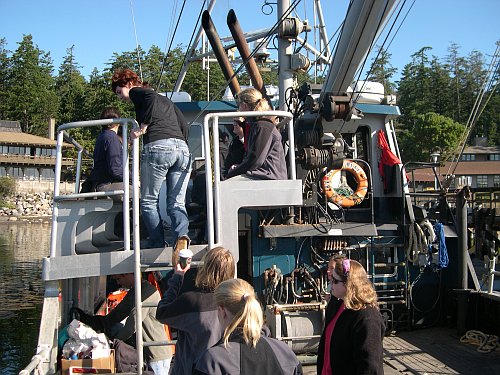
Contents
Professor Knut Schmidt-Nielsen (1915-2007)
Steven Vogel, Barbara Block, Stephen Wainwright
Experiences in Integrative and Comparative Biology
Ron Dimock and Linda Walters
Message from the President
John Pearse
Message from the Treasurer
Ron Dimock
Message from the Program Officer
Linda Walters
Message from the Secretary
Lou Burnett
Divisional Newsletters
Comparative Biomechanics (DCB)
Comparative Endocrinology (DCE)
Comparative Physiology and Biochemistry (DCPB)
Evolutionary Developmental Biology (DEDB)
Division of Evolutionary Developmental Biology (DEDB) and Division of Developmental and Cell Biology (DDCB): 2007 Spring Newsletter
In this newsletter:
- Message from the Chair
- Message from the Program Officer
- Message from the Secretary & Secretary-Elect
- Message from the Student/Postdoc Representative
- Candidate for DDCB Elections
- Candidates for DEDB Elections

Photos in this newsletter courtesy of Bruno Vellutini
Message from the Chair
Billie J. SwallaHappy Spring, everyone!
Spring is a time of longer days (even earlier this year, as daylight savings time is extended), and rebirth, eggs, embryos and larvae. We hope you like the accompanying pictures, taken during the Comparative Embryology Course at FHL in the summer of 2006. We had a terrific class of students, which makes it clear that Evo-Devo research will continue to flourish and break new ground. We'll be teaching Evo-Devo again at FHL in the summer of 2008. The Division of Evolutionary Developmental Biology is doing well, thanks to our membership, who regularly attend the meetings and put together cutting edge symposia. The Phoenix meetings were busy for our division and frequently it was hard to choose which presentation to attend. This is due to an excellent program put together once again, and for the last year, by Dr. Eduardo Rosa-Molinar. I would like to thank Ed, from all of us, for his tireless energy and enthusiasm that have greatly benefitted DEDB.
One of the consequences of the vitality of DEDB was the subsequent struggle to find officers for the Division of Developmental and Cell Biology. We hope to keep both of these divisions strong in SICB. Therefore, I am pleased to announce that Dr. Karen Crawford, who studies squid development, has agreed to run for Chair of DDCB. Some of you may have seen Karen's cool movies at one of her posters in Phoenix. I am looking forward to working with Karen to revitalize DDCB with a full slate of officers and separate symposia. Dr. Eduardo Rosa-Molinar is currently serving as Editorial Board Representative for DDCB, making sure that our voices are heard. Dr. Paulyn Cartwright, who gave a great talk on Cnidarian phylogeny and evolution in Arizona, has agreed to be the DEDB Editorial Board Representative. Many thanks, Paulyn!
This spring we have several elections, so please take the extra time to vote! We will elect a new Chair and Secretary for the DEDB. Thanks to all of the candidates for running and to Dr. Marcus Davis, Dr. Ann Burke and Dr. David Stock for serving on the nominating committee. The best part of my position is having so many talented people involved in DEDB and DDCB.
Now is a good time to think about putting together a symposium for the Boston meetings in 2009. I hope to see you all in San Antonio in 2008, it is a great venue and, as always, I can promise excellent science.
Have a great summer!

Message from the Program Officer
Wendy M. OlsonGreetings from the land of ice and snow!
OK, so Iowa isn't exactly the Island of Enchantment, but Ed Rosa-Molinar has finally stepped down after a highly successful 6-year run as Program Officer. Many thanks to Ed for all of his dedication and hard work. No one is sadder to see him go than I.
The Phoenix meeting was by all accounts a success. DEDB/DDCB supported three symposia: "Linking Genes and Morphology" (F. Galis & D. Carrier), "Key Transitions in Animal Evolution" (B. Schierwater, S. Dellaporta & R. DeSalle), and "Evolutionary and Functional Genomics of Sperm, Sperm Storage and Fertilization" (T. Karr & S. Pitnick). Many thanks to the organizers and presenters! Two students were awarded $100 for their presentations. Best talk went to Karin Leiderman (DDCB), "Endothelial Mechanotransduction: Let's Sugarcoat it!"; best poster went to Robert Gueth (DDCB) "Functional Conservation of Electric Fish Myogenic Regulatory Factors." Congratulations, Karin and Robert! And a big 'thank you' to all the judges.
One of the issues that continues to come up is the Keywords list for abstracts. Everyone seems to be fond of personalizing their own keywords as much as possible, so that the list has expanded considerably and is no longer the effective tool that it should be. We are working on this, and I will undoubtedly solicit your feedback. Another thing to think about is the idea manipulating our keyword choices to group talks into "minisymposia". Yes, this seems to contradict my first complaint. But if a group of you comes up with a really hot topic, and it is too late to organize an official symposium, you can effectively group your presentations by selecting the same (possibly unique) keyword. Something to think about as we look ahead to San Antonio.
DEDB/DDCB is currently supporting two symposia for the San Antonio 2008 meeting: "Reptile Genomics and Evolutionary Genetics" (Dan Janes & Chris Organ) and "Vertebrate Head Segmentation in a modern Evo-Devo Context" (Shigeru Kuratani & Thomas Schilling). They have wonderful speakers lined up and are in the process of looking for funding, so we should all wish them success. It is also time to start thinking about Boston 2009! The deadline for symposium proposals is August 17, 2007. Our division is as strong or as weak as we choose to make it, so keep those proposals coming! Please feel free to contact me (wendy.olson@uni.edu) with proposals or ideas at any stage of gestation - I am happy to help you flesh them out. If I do not hear from anyone, I will interpret the silence as permission to push my own agenda. And just to warn you all, I am a raving structuralist. But seriously, always look ahead, think about where you want our division to go, and send me your ideas. Now.
Thanks again, Ed! You're a hard act to follow.

Message from the Secretary
Marcus C. DavisFellow devo-friends,
For many of us, the Phoenix meeting was a welcome escape from winter torpor. There were so many fantastic talks to attend, thanks to the three DEDB/DDCB supported symposia, and so little time. I was equally impressed by the quality of the work presented in the poster sessions. Indeed, many of the most impressive posters were from undergraduates, a very promising trend for the future of Evo-Devo!
I would like to extend my sincerest thanks to outgoing Secretary Frietson Galis for making my transition relatively stress free. Thank you for all of your efforts, Frietson! I'd also like to thank outgoing Program Officer Ed Rosa-Molinar for his years of guidance and welcome our new Program Officer Wendy Olson!
I'd wish to encourage members to contribute to our researchers database. If you haven't already done so, or would simply like to update your current page, send your information to me at marcusd@uchicago.edu and I'll forward them onwards to our genius webmaster Ruediger Birenheide. Please send images in .jpg format and remember that you can also provide html links to your personal and departmental research pages.
Here are the abbreviated minutes of our business meeting during the conference:
Business meeting DEDB, Thursday, 6 January 2007
Opening of the meeting by our Chair, Billie Swalla.
Discussion on the future of the DDCB and proposal to recruit new DDCB officers.
Proposal to form Nominating Committee to elect new Chair and Secretary.
Site of future meeting announced (09 Boston).
Outgoing Secretary Frietson Galis says good-bye and hands over to new Secretary Marcus Davis.
Report from the Secretary, Marcus Davis (see this thing you're currently reading).
Report from the out-going Program Officer, Eduardo Rosa-Molinar and hand over to new Program Officer Wendy Olsen (see her report in this newsletter).
Visit from Society-wide Officers: Outgoing President, Sarah Woodin; Incoming President John Pearse; Treasurer, Ronald Dimock; and Program Officer, Linda Walters.
Report of the Student/Post-doc Representative, Nathan Bird (see his report in this newsletter).
NSF Representative Judy Venuti reports on changes in the structure of the IOB Division. See NSF website for details.
Call for further business
Adjournment, DEDB social!
I would like to close by thanking the other members of the Nomination Committee, Dr. Ann Burke and Dr. David Stock for their efforts and insights. I'd also like to thank our Chair, Dr. Billie Swalla for being such a pleasure to work with - although I think she now owes me a beer.
Message from the Student/Postdoc Representative
Nathan BirdGreetings fellow DEDB graduate students and post-docs!
I hope everyone had a great time at the Phoenix meeting. With no news to report from the SPDAC, I will keep my message brief. I was very pleased with the turnout at the workshop, it was very informative and I, for one, learned quite a bit. Hopefully you all benefited as well. There will be elections for multiple DEDB officer positions this Fall, so be sure to watch for an announcement and vote. That's about all for now - have a great year everyone!
Best wishes from balmy DC,
Nathan Bird

Division of Developmental and Cell Biology Election
Candidate for DDCB Chair
Karen Crawford
Current position: Professor of Biology, St. Mary's College of Maryland, St. Mary's City, MD.
Education: B.S. (Zoology), 1980, University of Massachusetts, Amherst, MA; M.S., 1985 and Ph.D., (Anatomy) 1987, University of Illinois, Urbana-Champaign, IL.
Professional experience: Postdoctoral fellow, La Jolla Cancer Research Foundation, La Jolla, CA (1998-2001); member and then chair Professional Development and Education Committee, Society for Developmental Biology (1993-2003); Junior Member at Large, Board of Trustees, Society for Developmental Biology (1995-1998); Principle Investigator (1999-present), Corporation member (2002-present) and member and current chair Housing, Food and Childcare Committee (2004-present) Marine Biological Laboratory, Woods Hole, MA; and Scientific Advisory Board - Indiana University Center for Regenerative Medicine (2006-present).
Other memberships: Society for Developmental Biology; American Association of Anatomists; Sigma Xi; American Association of the Advancement of Science; and American Associate of University Women.
Research interests: Molecular mechanisms that govern pattern formation in regenerating amphibian limbs (Ambystoma mexicanum), regenerating worms (Lumbriculus variegates) and developing cephalopod embryos (Loligo pealii).
Goals statement: I gave my first scientific paper on limb regeneration at the American Society for Zoologists (ASZ) meeting in 1984. It was an important milestone in my graduate career. More recently, I have returned to the annual SICB meeting and found it to be both welcoming to students and faculty of all levels and institutional affiliation, as well as refreshingly diverse in its breadth of biological organisms, topics and levels of scientific approach. It continues to be a melting pot for fundamental biological discovery. I welcome the opportunity to serve this Society through the division of Cell and Developmental Biology and look forward to both continuing its traditions and with the help of our membership developing new ones. I see this division as an important place where cell and developmental biologists from all levels of their academic training can make fundamental connections between their systems and discoveries.
DEDB Candidates for Elections
Candidates for DEDB Chair
Linda Z. HollandCurrent position: Research Biologist. Scripps Institution of Oceanography, University of California San Diego
Education: B.A., M.A., Stanford University; Ph.D., University of California San Diego.
Professional experience: Editorial Board, Evolution and Development; coordinator for the amphioxus genome project
Memberships: Society for Integrative and Comparative Biology (SICB); Society for Developmental Biology (SDB)
Research interests: Genes, development and genomics of the basal cephalochordate, amphioxus, as a proxy for the ancestral vertebrate. Amphioxus, which is vertebrate-like, but much simpler both genomically and structurally is revealing the fundamental basis on which were built the many variations of vertebrate embryos.
Goals statement: I joined the American Society of Zoologists (ASZ) in 1992, the year we published the first genes and development paper on amphioxus, because I wished to get the message out that evo-devo in general and amphioxus in particular were up-and-coming and interesting and because the ASZ was the major forum for "real biologists" in the U.S.A. I have been very pleased to see that the Division of Evolutionary Developmental Biology has formed and prospered within the ASZ-now the SICB- as a group of like-minded colleagues who are more interested in the evolutionary aspects of the animals they study than their acceptability and fundability as "model developmental systems." I have been impressed by the high quality of the SICB symposia in which I have participated including Molecular approaches to Zoology and evolution in 1995, The evolution of development: Patterns and process in 1998, Developmental and evolutionary perspectives on major transformations in body organization in 1999 and Linking Genes and Morphology in Vertebrates in 2007. My program as DEDB chair would include: 1) encouraging more such high-quality symposia; 2) encouraging the careers of advanced undergraduates, graduate students and postdoctoral fellows in devo-evo (my own graduate students and postdocs have shown that it is possible to get a good job in devo-evo); 3) encouraging joint symposia and paper sessions with other SICB divisions -in particular the DVM and DSEB; 4) attracting new membership and exploring possibilities for joint workshops with the Society for Developmental Biology (SDB).
David W. Stock
Current Position: Associate Professor, Department of Ecology & Evolutionary Biology, University of Colorado, Boulder, Colorado.
Education: Ph.D. in Biology 1992, University of Illinois at Urbana-Champaign; B.Sc. in Marine Biology 1985, Texas A&M University.
Professional Experience: 1999-2006: Assistant Professor, Department of Ecology & Evolutionary Biology, University of Colorado; 1994-1999: Postdoctoral Research Associate, Department of Anthropology, Pennsylvania State University; 1992-1994: Postdoctoral Scholar, Hopkins Marine Station, Department of Biological Sciences, Stanford University; 2006-present: Member of the Editorial Board, Journal of Experimental Zoology B: Molecular and Developmental Evolution.
SICB Activities: SICB (and DEDB) member since 2004.
Other Memberships: Society for Developmental Biology.
Research Interests: I am interested in the extent to which features of the genetic control of development bias the paths of morphological evolution. My main study system is the dentition of vertebrates, with an emphasis on teleost fishes. Evolutionary topics under investigation include structural reduction, meristic variation, diversification of serially homologous parts, and irreversibility of evolution. Experimental approaches to these problems include analysis of gene expression, gene knockdown, transgenic misexpression, and reporter gene analysis of enhancer function.
Statement of Goals: While I only recently joined SICB, I have found it to be the most welcoming and supportive of Evolutionary Developmental Biology among the societies whose meetings I have attended. My most enjoyable experience through SICB to date has been participating in a symposium which brought together model organism-focused biologists (broadly interested in the unity of life) and comparative biologists (broadly interested in the diversity of life). I believe such interactions are crucial to the health of Evolutionary Developmental Biology, and would like to continue efforts to encourage those working on biomedical model systems to participate in DEDB and SICB. Similarly, I would like to encourage participation of plant biologists in DEDB. My own interactions with departmental colleagues working in plant Evo-Devo suggest that such participation is possible and likely to benefit all involved.
Candidates for DEDB Secretary
Eric Haag
Current position: Assistant Professor of Biology, University of Maryland, College Park, MD USA
Education: B.A., 1990, Oberlin College; Ph.D, 1997, Indiana University, Bloomington.
Professional experience: Jane Coffin Childs postdoctoral fellow, University of Wisconsin, Madison, 1997-2001; delivered invited seminars at 28 academic or conference venues since 2000; reviewed manuscripts for 14 different journals, including the SICB-sponsored Evolution & Development, since 2000; guest editor, Seminars in Cell & Developmental Biology, 2007; ad hoc grant reviewer for 6 different agencies in North America, Europe, and Asia since 2002; published 14 peer-reviewed papers in integrative and comparative biology since 2000.
SICB Activities: None so far (other than reading and contributing to Evolution & Development).
Other memberships: Society for Developmental Biology, Society for the Study of Evolution, and the Genetics Society of America.
Research interests: I'm generally interested in the proximate developmental and genetic mechanisms that underlie the adaptive evolution of novel reproductive strategies. My graduate work was on direct development in Australian sea urchins, and my postdoctoral work (which I continue today in my own lab) is on the evolution of self-fertile hermaphroditism in Caenorhabditis nematodes. This latter project focuses on sex determination and how it is modified in the germ line to allow selfing to occur. More recently, I have begun studying the genome-level consequences of adopting self-fertility and the molecular evolution of interacting developmental genes in the sex determination pathway.
Goals statement: I am a newcomer to SICB, yet have been an "integrative and comparative biologist" for almost 20 years, and know many SICB members and leaders well. I primarily regard this office a good opportunity to get involved in a great organization I should have joined long ago. However, if I elected Secretary of the Division of Evolutionary Developmental Biology, I will certainly carry out the duties of Secretary with great vigor.
Andrea Ward
Current Position: Assistant Professor, Department of Biology, Adelphi University, Garden City, NY
Education: Ph.D., University of Massachusetts Amherst, 2005
Professional Experience: Postdoctoral research at the University of Chicago with Victoria Prince, 2005-2006
SICB Activities: SICB member since 1998.
Other Memberships: American Society of Ichthyologists and Herpetologists, International Society for Vertebrate Morphology, Sigma Xi, Society for Developmental Biology.
Research Interests:
My general research interest is in the evolution of body shape. Specifically, I am interested in how body shape evolves through genetic and developmental changes, and the effect of body shape changes on locomotion and predator avoidance. My recent research has focused on the evolution of elongation in vertebrates. In this work, I documented the morphological changes associated with the vertebral column in elongate fishes and have proposed several hypotheses concerning the developmental control of these traits. In addition, I have investigated the effects of elongation on other aspects of morphology including the gastrointestinal tract.
Statement of Goals:
As secretary of DEDB, I will continue the work of our previous secretaries in improving communication among the members as well as making our divisional website an integral information source for news concerning the field of evolutionary developmental biology. In addition, I will continue the current initiative to have research summaries of members put on the website so that we can highlight the amazing diversity of research conducted by our members.
Elaine Seaver
Current Position: Assistant Professor, Kewalo Marine Laboratory, University of Hawaii
Education: Ph.D., University of Utah, 1995
Professional Experience: Assistant Professor, Kewalo Marine Laboratory, University of Hawaii, 2002- present; Junior Researcher, Kewalo Marine Laboratory, University of Hawaii, August 2001- April 2002; Postdoctoral Research Fellow, Kewalo Marine Laboratory, University of Hawaii, 1999-2001; Postdoctoral Research Fellow, Department of Zoology, University of Texas at Austin, 1997-1999
SICB Activities: SICB member since 1999. Co-chair, Contributed papers for Evolution and Development: plants and invertebrates. SICB Annual Meeting, 2001
Other Memberships: Hawaii Academy of Science, Society for Developmental Biology
American Association of University Women
Research Interests: My interests generally include body plan evolution, and we primarily approach this issue from a developmental perspective. We have focused on a number of developmental questions in the lophotrochozoans, specifically working with polychaete annelids. We have taken a comparative approach, although more recently have focused our efforts on Capitella sp. I, a representative lophotrochozoan. Capitella is a small, segmented marine polychaete annelid and has a number of interesting features that make it particularly amenable for developmental studies. Capitella sp. I is among the first lophotrochozoan genomes to be completely sequenced. The features of Capitella and of many polychaetes allow many fundamental questions to be asked, such as whether the mechanisms of adult body segment formation is the same during embryogenesis, adulthood and regeneration, and whether these processes are homologous throughout the Metazoa. The molecular control of segmentation in annelids is poorly understood relative to what is known for other segmented groups, and thus we have identified orthologues of the Drosophila segmentation gene cascade and the vertebrate somitogenesis pathway in Capitella sp. I. We have also initiated projects with Capitella sp. I on neurogenesis, examination of dual ontological origins of mesoderm, and gut development with the idea that a fundamental understanding of developmental processes can benefit from comparative studies in phylogenetically diverse animals.
Statement of Goals: DEDB represents a vibrant, active division and includes researchers from a range of disciplines. The DEDB division at SICB represents the most important national arena for interactions among people in the field of evolution and development. As the field of evolution and development continues to mature, it is important that we move forward as a cohesive group, and maintain a national presence. Having attended and participated in the SICB meetings since before the DEDB division was founded, I would now like to increase my involvement in this important division, and hope that as secretary, I can increase and facilitate communication among members of the division.